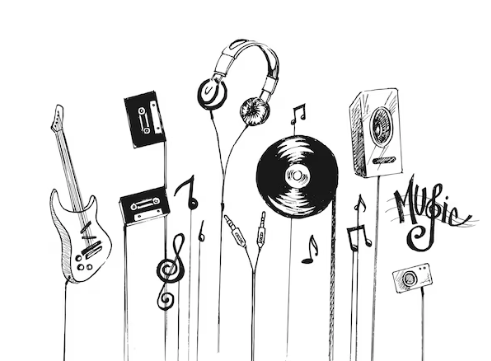In today’s society, simplicity sparks heated debate. Some view it as a way to live life easily, while others view it as a threat to rare and meaningful experiences. For better or for worse, simplicity has infiltrated every part of our lives, including popular music, with straightforward pop songs of rudimentary structure and harmony becoming the most consumed material in our age. On the one hand, this has produced incredibly catchy, danceable, and enjoyable tunes; on the other hand, it can feel artistically restrictive, setting a poor precedent for originality in the music industry. This evolution has come with various consequences for our soundscape.
Almost any given pop song follows some variation of the verse-chorus form and cycles through a limited set of simple chords—basic units of harmony formed from specific notes of a musical key. In fact, any given song likely shares nearly exact foundational harmony with others. This contrasts the more complex styles of music popular in earlier times. In western culture through previous centuries, much of this consisted of symphonic music. In modern times, there are also many works that prioritize expression over conventionality; however, the more simplistic popular music is far more prevalent than these works. Complexity in music allows pieces to articulate themselves with more detail, but it comes at the cost of less accessibility and popularity.
The issue at hand is that common songwriting formulas can become repetitive, leading to a lack of creativity. Many producers follow the philosophy of using composing methods that have made previous songs famous instead of searching for unfettered creativity. By following common chord progressions, themes, and organizational forms, “cookie-cutter” songs have become widespread, perhaps burying true artistic value. Take Maroon 5’s “Memories” as an example. It uses a chord progression from Pachelbel’s Canon in D along with a nearly identical melody. But it’s not just “Memories:” many pop songs have used the same or a similar chord progression, including Green Day’s “Basket Case.” One would be similarly hard-pressed to find a top song that does not mention themes of romantic desire. Comparing the melodic and lyrical themes of many popular songs reveals an apparent lack of creativity in popular music, with many songs consistently following similar formulas.
Some of this copying has been far too identical, leading to a number of lawsuits, many of which achieved little results as those involved were found to simply have stumbled upon the same reused musical ideas by coincidence. Even in some of culture’s most treasured works, this repetition seems inevitable. For instance, The Beatles’ “Let It Be,” Adele’s “Someone Like You,” and A-Ha’s “Take on Me” share one of the most common chord progressions. Any song built with the style of modern pop in mind almost always ends up copying the chords of another, simply because there are only so many to use.
Music is an important medium of artistic expression, and these modern songwriting practices are potentially degrading them. The gravitation of composers and listeners of popular music to overused and restrictive formulas harms opportunities for creativity—further dissuading others from creating more unique works in order to appeal to the status quo of the wider public. The shaping of the industry and public ear around this kind of content potentially limits the scope of popular music to something increasingly unoriginal.
But what is causing music to shift towards simplicity? Music has become more and more commercially-driven due to the growth of advertising and media, so many contemporary artists naturally drift towards rhythms and chords that worked for previous artists, aiming to make it big. This change is mostly due to the consumers rather than the musicians themselves. It is well known that our attention spans are shrinking dramatically due to the endless distractions in our lives like social media as well as the quicker paced lifestyle driven by efficiency. We as consumers, especially with the growing enjoyment of short videos in the form of Tiktok and Instagram reels, have started to enjoy simpler music with its short but catchy hooks rather than the long and developed music, which requires the consumer to have the patience and dedication to sit through the whole piece.
Despite these criticisms, however, the oversimplification of modern music is not entirely bad. For one, these issues are generalized. There are still plenty of creative, artistic, and popular artists who do not see oversimplified music theory as an outlet for expression instead of a shortcut. Furthermore, simplicity makes music easier to listen to, compose, and recite. Some may say that we are leading an endless spiral towards simplicity, but even amidst the trends of music, there are always musical artists who continue chasing creativity and innovation and consumers who carry on the legacy of prior genres and songs.
The changing of times has brought about many differences in how people see music. While compositional simplicity can be a liberating basis for more enjoyable and easy-to-listen-to music, there are concerns that this enables a lack of creativity and restricts mainstream listening habits. As always, it is important to listen to a diverse range of musical creations to see beyond an age’s conventions. Music’s evolution has brought about unexpected modern changes for better or worse.


